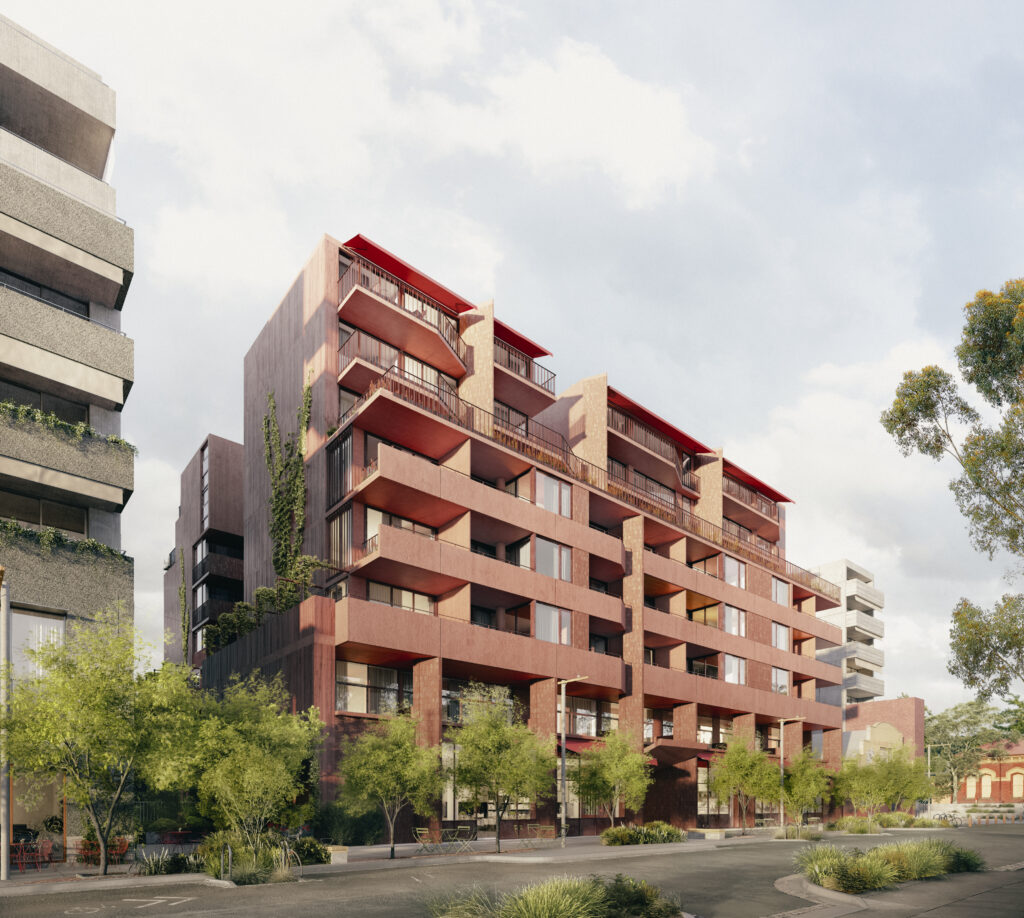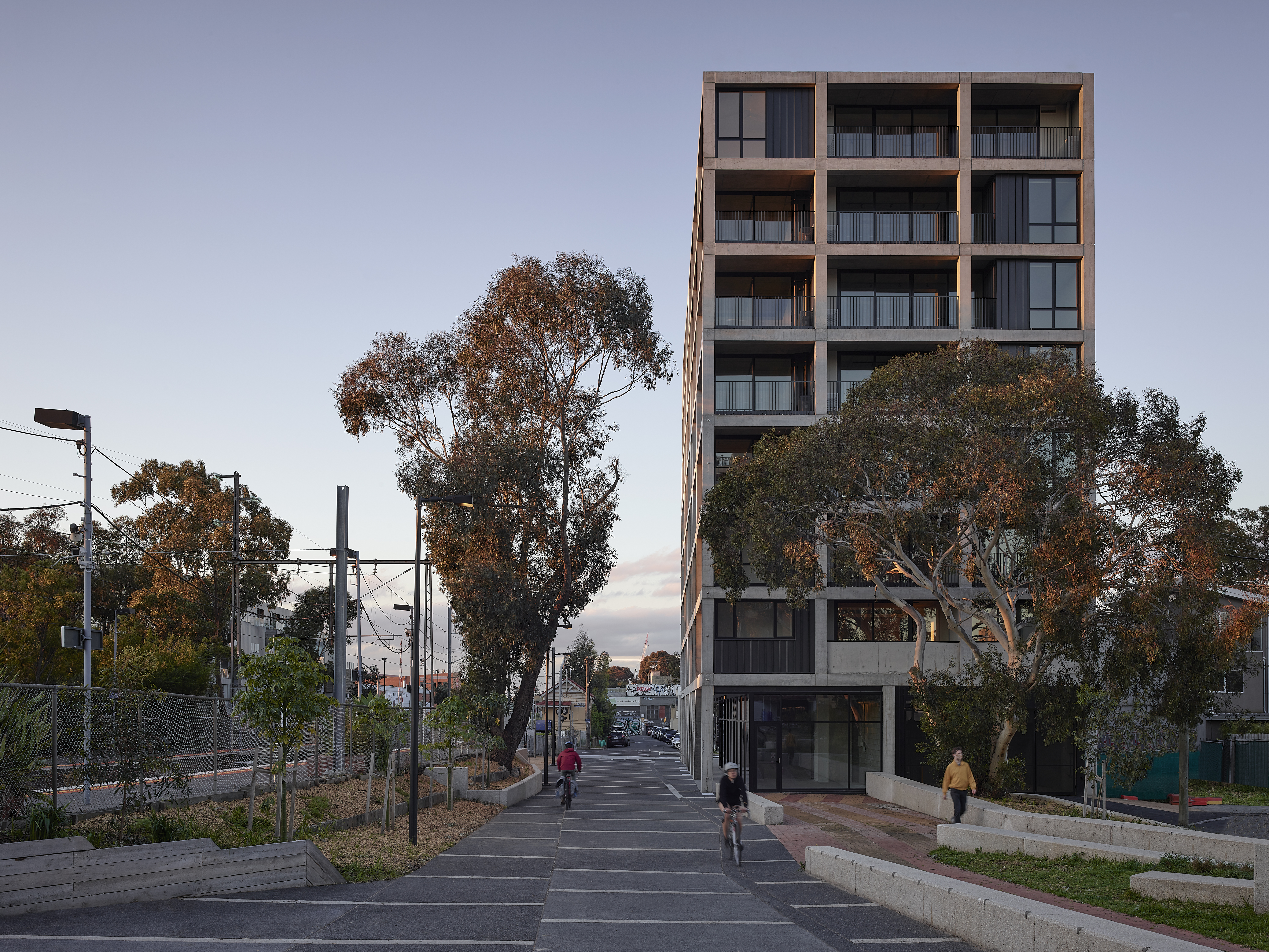For more than thirty years, Neometro has delivered beautiful, functional, and intentionally designed residential projects across Melbourne. The Certified B Corporation is dedicated to creating developments with people at the centre, with work spanning Fitzroy to South Yarra. With more people focused on where they live than ever before, we spoke to one of Neometro’s directors, James Tutton, to understand what a property developer can gain from being purpose-led.

Andrew Davies: Neometro certified in 2014, and at the time, B Corp had been around for less than a year in Australia. It was absolutely a movement on the fringe, a group of businesses trying to do things differently. There are now more than 4,400 B Corps globally and 350 in Australia and Aotearoa. What did you do differently in your business in 2014 that made you think ‘this is interesting and something I want to do’?
James Tutton: There was a multitude of factors. One of them was my personal view that business could be used to have a positive impact, above and beyond the very old-fashioned notion that businesses just exist to make money.Becoming a B Corp was, in a lot of ways, a formalisation of something which was very much in place at Neometro. Right at that time, I was also starting Smiling Mind, a not-for-profit I co-founded. I’ve always held the view that if you’re fortunate enough through circumstance to be successful commercially, there’s really an obligation to contribute, whether that be financially, with time, or connectivity. Focusing on Smiling Mind had me thinking about how, within a for-profit business, we actually formalise our contribution by being part of a movement.
As a highly commercial business, we felt it was a way to show leadership in an industry that doesn’t have a reputation of acting in the interest of the greater good. It’s been really exciting to see other developers over the last few years become B Corps as well and embrace the process and values.

Nine Wilson Avenue, Brunswick
Andrew Davies: One of the phrases that we use in the B Lab world is the idea of balancing purpose and profit. It’s actually not one I like, because, to me, it connotes that there’s a trade-off. Sometimes, of course, there is, and you make business decisions that negatively impact the bottom line. The reality is that we’re seeing impact and purpose in business can drive profits.
James Tutton: It does. There are definitely situations where there is a trade-off, but anecdotally, I’ll say 80% of the time, there isn’t a trade-off or it gets paid back later. I look at Neometro and the way we consider decisions — which would fall into the bucket of ‘B Corp-esque’ decisions — and they’re often fantastic for our brand, fantastic for our relationship with buyers, fantastic for our relationships with people who are making town planning decisions, and therefore good for business.
Andrew Davies: Back in the early days of B Lab in Australia, you were on the board. You were both getting your business certified, but also making a different type of contribution to building the movement. With that unique perspective of being closely involved from the early days, how do you see the evolution of the B Corp movement in Australia in particular?
James Tutton: I think the evolution has been and should be, around more commercially-orientated businesses becoming B Corps. I’ll use Milieu, another real estate developer with who we are close, as a prime example. I see their involvement as a really positive thing, as it shows B Corp as a place for highly commercial businesses. More generally, there has definitely been an evolution in terms of this pandemic and what people’s values are and what people want from their professional life, including flexibility and it being rewarding. I think these values have changed in a way that have brought them closer to the values of B Corp.
Andrew Davies: We have definitely seen that through the pandemic. Back in March 2020, every accountant in the world was telling their clients to cut costs. We thought that because certification is an extra cost and resource commitment, it could be a real problem for us. But in fact, we’ve seen the opposite. The demand for growth over the past two years has been driven by exactly what you’re talking about.
You’ve just completed your third recertification as a B Corp at Neometro and it doesn’t necessarily get easier. It gets harder! So why go through it again? What else is going on that’s driving you to stay a B Corp?
James Tutton: It’s important that until there’s broader social and cultural change around defining business success, companies like Neometro remain as B Corps. There’s a challenge around the thinking of B Corps entering the mainstream, but I think at times, there’s a real danger of a group of like-minded inner-city folk preaching to the converted. What I think we need to do is continue taking B Corp to the mainstream business community. You can sit here in Melbourne and think there’s a huge amount of change going on, but it’s not usually reflective of the thinking in Bundaberg or Rockhampton.

Andrew Davies: Let’s shift gears into Neometro itself. We caught up with Michael from Milieu recently and talked about urban density. Most people aspire to have more space to live in, but what do communities have to gain from density — especially in a country as geographically large as Australia?
James Tutton: I think there’s a multitude of issues there and I think at the core of it, it’s building housing which is in immediate proximity to infrastructure. Infrastructure, in terms of hospitals, education institutions, retail, and so on, is hugely important. That infrastructure should be both practical and social, like parks or sporting and events venues. We ran a Speaker Series and did some research about what we call ‘High Density Happiness’, and the drivers of wellbeing in medium density, urban environments. We wanted to explore how that could be supported by proximity to infrastructure, but then also the nuances of the building — down to what kind of acoustic insulation we use to mitigate noise, which has a flow-on effect for mental health. Getting the lighting right, creating a level of safety which, again, has a material impact on mental health. But I think it really comes down to access to infrastructure, which needs to be balanced with access to nature and green spaces. That is incredibly important for wellbeing too, and that was highlighted during the pandemic.

High Density Happiness Speaker Series
Andrew Davies: You mentioned earlier that your industry has a bad reputation. What you said about considering the impacts of materials or location on mental health and wellbeing doesn’t sit with most people’s expectations of a property developer; most people would assume you’re just thinking about minimising cost. How do you marry those two things together?
James Tutton: Cost is relevant, but it’s important to note that Neometro apartments aren’t ‘cheap’. They are great value, but they are very different to the ones going up in the same areas. The materiality is different, the layouts are different, the acoustic treatment is different, the way the air conditioning is concealed is different, the tapware is different. We provide something which we think is great value, has durability and liveability, because they’re made for the owners and occupiers instead of investors. Most of our team are architects, so our lens is one of design and liveability, whereas most developers can work with a graphic designer on a really nice render, but it’s unclear how that actually evolves into built form.
Andrew Davies: How do you actually understand what your customers want? How do you build relationships in something that is typically transactional?
James Tutton: We like to know our buyers and it occurs somewhat informally. More recently and as we’ve grown, it also happens formally in terms of research, focus groups, post-occupancy surveys, and so on. We actually build up a far better understanding of what they value, and not just what we think they value. A lot of our buyers are repeat buyers too, who move around in different stages of their life. It’s a strong following.

Jewell Station Brunswick, photography by Derek Swalwell
Andrew Davies: What about the other classic critique of a property developer having no regard for the local community? Neometro creates a lot of mixed-use spaces, which introduces different stakeholders, including business tenants. How do you build relationships with communities you’re building in?
James Tutton: It’s not always easy. In something like our Jewell Station Village project in Brunswick, we have five parcels of land which will become four buildings. That’s interesting from a community perspective because when you have a precinct, you can have more input into more than just your singular bit of dirt, so to speak. We do things like put community gardens on the tops of our buildings and fill vacant sites with art galleries. Then when the building is occupied, we try to build connectivity between people in the building with things like workshops and planning sessions. Not one of these things in its own right necessarily creates community — there’s no silver bullet. It can’t be forced. As a developer, you can try to light a flame in terms of community, but ultimately, people need to rally around it for it to work.

